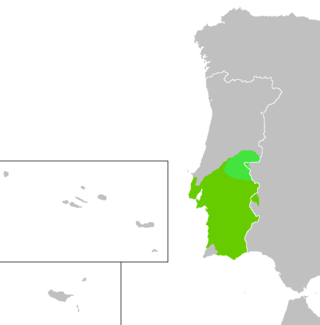Top Qs
Timeline
Chat
Perspective
Alentejan Portuguese
Portuguese variety of Alentejo, Portugal From Wikipedia, the free encyclopedia
Remove ads
Alentejan Portuguese is a dialect of Portuguese spoken in most of the Portuguese region of Alentejo. It is also spoken, with its own subdialect, in the disputed municipalities of Olivença and Táliga. In this area, the language is currently endangered.
Remove ads
Characteristics
This section needs expansion. You can help by adding to it. (December 2009) |
Alentejan Portuguese is thought to be influenced by the regions large focus on agriculture and livestock. Vowels are after stretched as be more easily heard over long distances. This coupled with a slow more deliberate pronunciation makes speakers of Alentejan Portuguese sound a bit more relaxed and simple compared to other dialects [3] Below are a few more traits that differenciate Alentejan Portuguese
- Presence of the article before the possessive pronoun, as in Ladino
- The regular use of the gerund in the present tense.
- A shift of ou to oi: oitro for outro
- Paragoge with i added to the end of verbs in the infinitive of verbs: fazeri for fazer
- The diphthong ei is replaced by e: galinhero for galinheiro
Remove ads
Cultural Significance
The Cante Alentejano is a type of polyphonic singing derived from Alentejan Portuguese. The singing is characterized by its emphasis on vocal melodies and lack of accompanying instruments.[4] In 2014, both Cante Alentejano and Fado music were listed by the UNESCO as Intangible Cultural Heritage of Humanity.[5]
Present situation in Olivença and Táliga
Summarize
Perspective
The 2005 report of the Council of Europe's expert group on the implementation of the European Charter for Regional or Minority Languages in Spain asked the Spanish government to furnish information about the situation of Oliventine Portuguese, and for measures for the protection and promotion of that language under the provisions of Article 7 of the charter.[6] However, in the report submitted by Spain in 2006, there are no references to Oliventine Portuguese.[7]
In the 2008 report issued by the Council of Europe, the following paragraphs were listed:[8]
48. The Expert Committee has received no information on the use of Portuguese in Extremadura, particularly in Olivença.
49. According to information gathered during the site visit, the Portuguese language (the Oliventina) is traditionally spoken in Olivença and Táliga since the 13th century. However, the information received on the current use of this language is inconclusive, but indicates that Portuguese is taught as a foreign language in the education field.
50. The Expert Committee can not assess the situation of Portuguese in Extremadura, and urges the authorities to clarify this issue in the next cycle of monitoring, particularly in cooperation with the association "Além Guadiana", recently established to promote the Portuguese language.
See also
References
Further reading
Wikiwand - on
Seamless Wikipedia browsing. On steroids.
Remove ads

